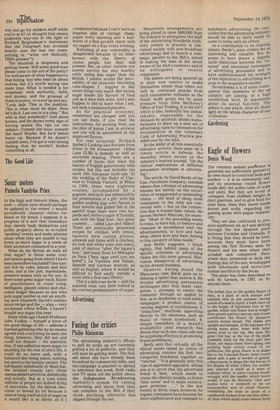The Good Life
Sour notes
Pamela Vandyke Price
In the high and historic times, the mob — which term should perhaps be updated to 'the voters' — would periodically clamour either for blood or for bread. I suppose it is progress of a sort that nowadays they merely bash themselves and public property about at so-called 'sporting' events and make piteous moan when they are unable to lug home as much sugar in a week as their ancestors consumed in a year.
What do the British do with all that sugar? Is there some cosy perversion going from which I have been heretofore excluded? One cannot live by cake, biscuit and bun alone, nor is the jam, marmalade, preserve season with us for aye. Is there some great sugar vault, haunt of practitioners in royal icing, meringues, glazed onions and chocolate fudge? Because as one who puts sugar neither in nor on anything save Elizabeth David's tomato sauce recipe and the,.— alas — very occasional creme brulde, I haven't bought any sugar this year.
Some while ago I heard Professor John Yudkin — himself a lover of the good things of life — address a learned gathering who by no means agreed with everything he said; one thing, however, they did not and could not dispute — his assertion that, if one added no more sugar to anything for the rest of one's life, it could do no harm and, with a balanced diet being eaten, nothing but good to the healthy person. The infrequent millefeuille or Mars bar, the isolated treacle tart, these menus plaisirs are trivia, dietetically and socially. But at a time when millions of people are indeed dying of starvation, for the British electorate to bewail its lot because it cannot bung itself as full of sugar as it would like is as idiotic as if I complained because I can't have an Imperial pint of vintage champagne every morning and a halfbottle of a first growth claret with my supper on a tray every evening. Rationing of any commodity .is disagreeable because of its interference with the liberty of choice people feel they still possess. But, as other nations not merely survive but stay healthy while eating less sugar than the British, I cannot accept the inevitability of our economy becoming cube-shaped. I happen to like sweet things very much. But excess sugar masks the flavour of food Just as it does with wine. And I also happen to like to taste what I eat, not suck a sweetened placebo. As for practical economy, sweeteners are cheaper and you can use them, if you read the instructions, for stewing fruit; use the slice of lemon I put in anyway and you will be astonished at the improved flavour.
For real escapism, Richard Barber's Cooking and Recipes from Rome to the Renaissance (Allen • Lane £2.50) is bedside as well as stoveside reading. There are a number of books that trace the history of English gastronomy with recipes, but this one includes the more chic European nosh-ups. At the wedding of the Duke of Clarence to Yolanda Visconti, at Milan in 1368, there were eighteen courses, accompanied by a pageant, and each one enhanced by the presentation of a gift: with the golden sucking pigs with flames in their mouths and gilded fish at the aperitif stage there were two leopards and twelve couple of hounds, and with the final fruit, two great coursers .. . called Lion and Abbot! There are practically presented recipes for chicken with lemon, Saracen stew (using prunes, almonds and dates with a chicken, its liver and white wine and cider), joint of mutton "after the legate's way," and many from Le Mdnagier de Paris ("beat eggs until you are bored"), La Varenne and Italian, Spanish and German sources, as well as English, which it would be difficult to find easily outside a town with a first-rate library.
This is a delicious book — and the material owes very little indeed to the current predominance of sugar.


































































 Previous page
Previous page